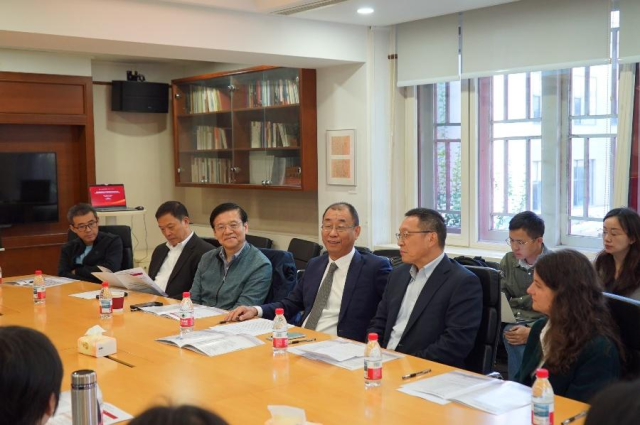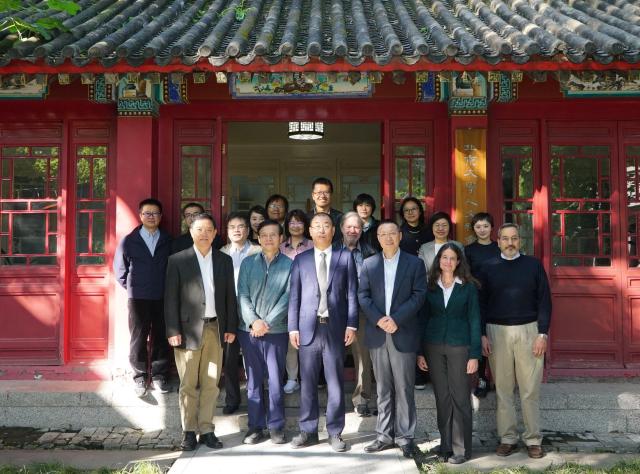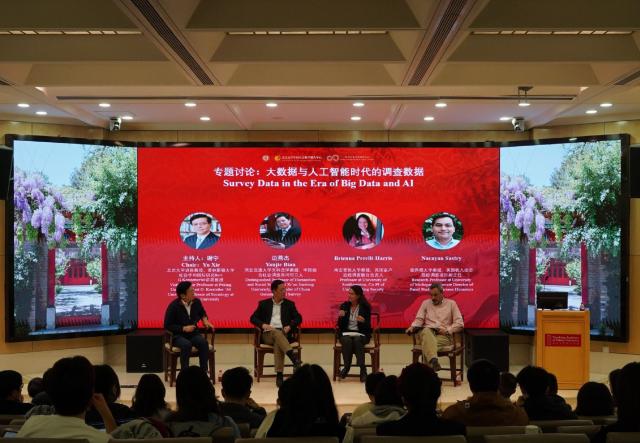Navigation
China Family Panel Studies (CFPS) Held the 2025 International Advisory Committee Meeting
来源:时间:2025-10-24 09:23阅读:
From October 13 to 14, 2025, the China Family Panel Studies (CFPS) held its International Advisory Committee Meeting at Courtyard No. 2 of Jingyuan, Peking University. The meeting was hosted by the Institute of Social Science Survey (ISSS), Peking University, and co-organized by the Center for Social Research, Peking University. Nine board members from the United Kingdom, the United States, Hong Kong, and mainland China attended the meeting, representing leading scholars in economics, sociology, demography, and survey methodology. The participants engaged in in-depth discussions on the future development of the CFPS project.

Jiang Guohua Exchanges Views with Experts from CFPS International Advisory Committee Meeting
Prof. Jiang Guohua, Vice Council Chair of Peking University, attended the meeting and delivered a speech, warmly welcoming all board members. He emphasized that the long-term accumulation of social survey data is a cornerstone of high-quality academic research. Peking University has always attached great importance to the CFPS project, continuously providing strong institutional and resource support. He reaffirmed that the university will continue to back CFPS in achieving its long-term development goals. Prof. Jiang encouraged the CFPS team to strengthen collaboration both within the university and with domestic and international peers, highlighting that the Advisory Committee plays a crucial role in providing intellectual support for the project’s high-quality growth. He expressed the hope that members would share their frontier experiences in social survey research and offer valuable advice to help enhance the quality of CFPS.
Prof. Donald Treiman, Distinguished Professor of Sociology at the University of California, Los Angeles, stated that CFPS, as China’s most important longitudinal survey project, not only provides high-quality microdata for studying social change and conducting cross-national comparisons, but also enhances Peking University’s visibility and influence in the global academic community. Prof. Zhang Junsen, Senior Professor of Humanities and Social Sciences and economist at Zhejiang University, emphasized that CFPS is a major academic public good contributed by Peking University to the international scholarly community, offering valuable data support for economic research. As a CFPS data user, he expressed admiration for the university’s sustained investment and commitment, noting that it reflects Peking University’s vision and leadership in advancing social science research. Prof. Narayan Sastry, Associate Director of the Panel Study of Income Dynamics (PSID) at the University of Michigan, remarked that CFPS provides a crucial window into China’s social transformation for the global research community, filling a major gap in international comparative household survey data by incorporating the experiences of one-fifth of the world’s population. Prof. Brienna Perelli-Harris of the University of Southampton, co-director of the UK Household Longitudinal Study, highly recognized CFPS’s academic value in comparative studies and its contribution to training young researchers.

Group Photo of the Participants
Prof. Zhang Zhixue, Director of the Institute of Social Science Survey, Peking University, stated that the institute will continue to leverage its professional team to enhance the project’s academic impact and support its sustainable development. With strong support from Peking University leadership and related departments, the institute will ensure high-quality operation of CFPS, contributing to the university’s disciplinary development and helping the global academic community better understand the social changes and development of China.
The conference also featured an open discussion session chaired by Prof. Xie Yu from the Center for Social Research, Peking University. Guest speakers included Prof. Bian Yanjie from Xi’an Jiaotong University, Prof. Brienna Perelli-Harris, and Prof. Narayan Sastry. The session focused on the challenges and opportunities for survey data in the era of big data and artificial intelligence, addressing issues such as the continuing value of traditional sample surveys, transformative impacts of emerging technologies on survey methodology, directions for training young scholars, and data sharing and ethical norms. Experts generally agreed that traditional surveys remain irreplaceable in understanding human behavior and social interaction and can complement big data sources such as administrative records and social media. Meanwhile, AI technologies can significantly improve data collection efficiency. Regarding the training of young researchers, participants emphasized that while mastering new technologies is important, solid theoretical grounding and methodological training remain the foundation of high-quality research. The discussion also touched on issues of privacy protection and data inequality in the integration of big data and survey data. Experts called for institutional designs to ensure fair access to research resources. On whether AI might replace survey or social science research, experts widely agreed that while AI is a powerful analytical tool that enhances efficiency, human insight remains indispensable in theory development, and the deep interpretation of findings.

Scene of the Panel Discussion
The two-day meeting, chaired by Prof. Xie Yu, featured detailed progress reports from the CFPS core team to the International Advisory Committee. Over the past 15 years, CFPS has successfully completed eight waves of national longitudinal surveys, serving 180,000 data users and supporting the production of over 9,000 academic works. The project has also made major advances in mixed-mode survey design and data management technologies.
Advisory committee members held in-depth discussions on key topics related to the upcoming ninth wave of CFPS in 2026, including questionnaire design, fieldwork implementation, data management, and user services. They offered forward-looking and practical suggestions that will provide a solid theoretical and operational foundation for the successful launch of CFPS 2026.
上一篇: Call for Proposals: Adding Survey Items to the CFPS2024
下一篇: 下面没有链接了